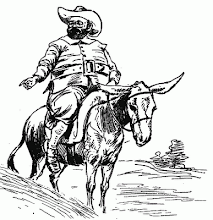As I've already noted in this blog, I'm a compulsive reader. Anything I'm thinking about or doing or thinking about doing, I borrow and buy books about. (This is why entire rooms of my house could be mistaken for a used bookstore!)
So, as you all can probably guess (provided there even is a "you all" out there reading this!), I have at least a few shelves full of books on shedding excess poundage, including lots of weight loss memoirs - the best ones make great inspirational reading, and even the not-so-good ones at least distract me from rooting through the kitchen and wolfing down calories instead.
I have to say, though, that there's a definite gender gap when it comes to weight loss books. Most of them tend to be written not only by, but also implicitly or explicitly for, women - which is totally understandable given the body image issues our culture saddles women with. Nevertheless, not being a woman myself, these authors can't quite lead me to identify with the Bridget Jones triumphs of finally fitting into slinky, seductive dresses, for instance, or catching the eye of a passing Prince Charming! I tend to find the triumphant last 50 pages of these books less personally compelling than the earlier sections, when the author builds up the resolve to diet and then sticks with it through the various setbacks all we problem eaters face. Those are the parts I keep in mind when I need a little extra motivation to get on the elliptical or not to order dessert!
On the other hand, the number of weight loss books written by and for men is a lot smaller, and many of those fall into what you might call the "Frito-Chomping Couch Potato Discovers His Inner Jock" category: how a guy whose main exercise used to consist of wheezing his way to the kitchen and back to the sofa during ESPN commercial breaks manages to haul himself to the gym and throw out his stash of fried pork rinds. Even though that was never my particular lifestyle, I can relate to starting an exercise program and cleaning out those kitchen cupboards. But by the time the last 50 pages roll around, he's benchpressing his own weight (current or former), playing full-contact pick-up basketball with the guys he used to envy at the gym, and shaving his now-flat stomach to show off his newly acquired six-pack abs at the beach. But me? I'd like to be less fat and more fit, sure, but I don't even have an inner jock - if I do, neither my father or an endless series of phys ed teachers and coaches ever managed to find him, and believe me, they looked. I couldn't care less about someday bonding sweatily with "the guys", so I tend to flip through the endings of these books, too, after being caught up in the authors' victories of mind over matter earlier on.
My conclusion? Male and female authors' descriptions of their weight and food problems are more similar than different at the beginning and in the middle of weight loss stories - being overweight makes both men and women feel like outsiders, and that sense of exclusion transcends gender. And the internal psychological battles to reclaim the control you either lost or never had over your own body and your own life are very universal experiences as well, whether you're male or female. The bigger differences set in after people become thin and fit enough that they stop always experiencing themselves as outsiders: at that point you're no longer socially categorized - and dismissed - as a "fat person". That's when every author's individual inner ideal of the man or the woman they want to be becomes their new goal; they've travelled from primarily wanting not to be something - fat! - to wanting to be something, and that something is often a sexy siren or a ripped fitness model look-alike.
But what's a heavy-set, geeky intellectual who just wants to be a medium-weight, geeky intellectual supposed to do?! There's only one answer: keep reading!
2 days ago

No comments:
Post a Comment